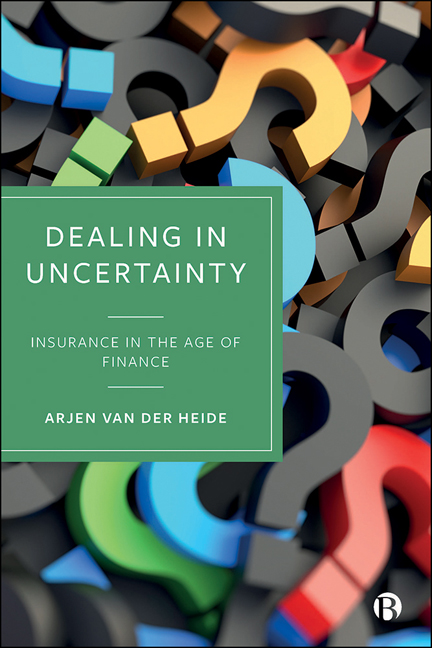Book contents
- Frontmatter
- Contents
- List of Figures
- Acknowledgements
- 1 Life Insurance in the Age of Finance
- 2 Financialization, Quantification and Evaluation
- 3 Shifting Boundaries between Insurance and Finance
- 4 Actuaries Going on a Random Walk
- 5 ‘Authors of Their Own Misfortune’
- 6 ‘Taking Account of What the Market Has to Say’
- 7 Managing Risk in Insurance
- 8 The Long Road to Solvency II (and Back Again?)
- 9 De-Risking Pensions, Managing Assets
- 10 Financial Evaluation and the Future of Insurance Society
- Notes
- References
- Index
9 - De-Risking Pensions, Managing Assets
Published online by Cambridge University Press: 20 January 2024
- Frontmatter
- Contents
- List of Figures
- Acknowledgements
- 1 Life Insurance in the Age of Finance
- 2 Financialization, Quantification and Evaluation
- 3 Shifting Boundaries between Insurance and Finance
- 4 Actuaries Going on a Random Walk
- 5 ‘Authors of Their Own Misfortune’
- 6 ‘Taking Account of What the Market Has to Say’
- 7 Managing Risk in Insurance
- 8 The Long Road to Solvency II (and Back Again?)
- 9 De-Risking Pensions, Managing Assets
- 10 Financial Evaluation and the Future of Insurance Society
- Notes
- References
- Index
Summary
The buyout transaction between the Vickers Group Pension Scheme and Legal & General was the largest of its kind in 2016.
We look forward to welcoming the 11,000 members of the Vickers Group Pension Scheme to Legal & General. We are pleased to have worked closely with the Scheme Trustees, their advisers Mercer, and the Rolls-Royce Group to achieve a full buyout. … We are grateful for being able to play a part as the Trustees, with patient and careful management, steered their way through the financial crisis, recession, the consequences of QE [quantitative easing] and latterly the outcome of the EU referendum before reaching the point where buyout was appropriate and achievable for all Scheme members. (Legal & General, 2016)
The pension buyout market, or pension de-risking market, has existed for much longer than the 21st century. Since the mid-2000s, however, the market has started to take off, with volumes steadily increasing from a few billion pounds per year in 2007 to over £10 billion from 2014 onwards, peaking in 2019 with £43 billion of pension liabilities being transferred to insurance companies (see Figure 9.1). The pension buyout market is a ‘runoff’ market, which is a secondary insurance market in which insurers trade closed books of liabilities that they want to get rid of to free up capital for new lines of business. It is a market in ‘legacy liabilities’ or ‘the bad bets on old insurance policies that tie up the insurer's capital’ (Baker, 2021, p 78).
In many ways, the buyout market is exemplary for changes in the life insurance industry more generally. The insurers competing in the buyout market seek to profit from legacy pension liabilities by finding profitable investments for the funds that accompany them. In so doing, the buyout market exemplifies a more general trend in life insurers’ business models: they increasingly focus on their role as investment intermediaries and less so as the ‘makers’ of insurance risk. Life insurers, in other words, are increasingly in the business of taking risk rather than making risk. Of course, it has always been true that insurance is not just about the management of uncertainty by risk-spreading. Insurers have always been taking risk (Baker and Simon, 2002; Ericson and Doyle, 2004).
- Type
- Chapter
- Information
- Dealing in UncertaintyInsurance in the Age of Finance, pp. 145 - 160Publisher: Bristol University PressPrint publication year: 2023



